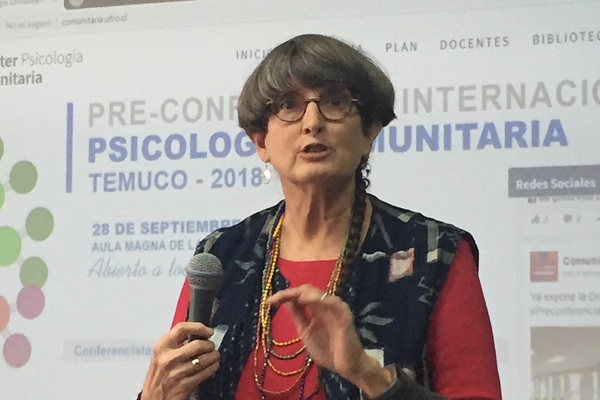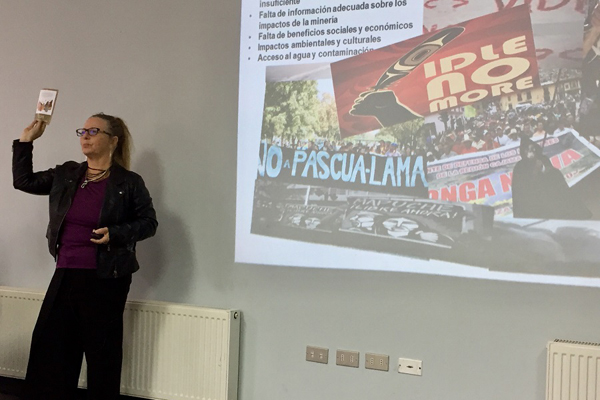|
Indigenous rights, the relation between the extractive industry and the loss of a national identity, psychology as an agent of change in disaster situations – these were some of the issues presented in the International Pre-conference of Community Psychology at the Universidad de La Frontera. |
Five renowned professionals were present in this event, which was the prelude for the seventh International Conference of Community Psychology in Santiago on October 4th to 7th. Apart from presenting the most recent results of their research work, they contributed to the debate that just started in our region after the launch of the Araukanía Promotion Plan. The event is the result of the efforts of the Universidad de La Frontera, Temuco Catholic University and University of Santo Tomás and they brought Dr. Terry Mitchell, an academic of the Wilfried Laurier University in Canada, Dr. Brinton Lykes of the Boston College in the USA, Irma Serrano and David Pérez Jiménez from Puerto Rico and the Cuban psychologist Carmen Nora Hernández to the UFRO in order to participate in seminars, workshops, conversations, and visits to the Mapuche Community, between September 29th and October 2nd. They participated in the practice-based seminar “Social coexistence and human rights: contributions from community psychology”, which was the inaugural event of this Pre-conference of Community Psychology. Dr. Mitchell, who was recently honored for her contribution to the study on indigenous rights in the Canadian context, was one of the speakers and gave an account of the increase in deaths of indigenous leaders while defending their territories. This was one of the conclusions presented at the conference “Indigenous rights and community psychology: Historical traumas and extractive projects”, a topic that, according to Dr. Mireya Palavecinos, director of the UFRO Master´s Program in Community Psychology, “is very important regarding the very contingent facts that take place these days in our country, and especially in our region considering the Araukanía Promotion Plan, which has just been presented and which poses a number of challenges regarding productive issues as well as the relationship with the Mapuche People. Canada is very advanced in this point.” The series of expositions showed the reality of community psychology as a special discipline in the treatment of social situations that get complex according to the local realities. One of those expositions was about gender-based violence, presented by Dr. Lykes, or the consequences Puerto Rico had to deal with after Hurricane María and that affected its population of almost three million people, or the political reality in Cuba after opening up to the US market. It was an academic event that brought professionals in social science and community leaders together and that fulfilled the objective of decentralizing the 7th International Conference of Community Psychology. It brought the Chilean Society of Community Psychology and a network of academic teams from 16 Chilean universities, which has been operating in Chile for more than 10 years and includes the Universidad de La Frontera, to our region. Apart from that, considering that in the 90´s new social problems came up in Chile which challenged psychology, such as discrimination, children´s rights, or policies for people living in extreme poverty, the psychologists started to work in multidisciplinary work teams in programs that permitted them to work in direct contact with the affected families. And, today, they have the UFRO in the south, as a reference for the work with vulnerable sectors and the creation of human capital regarding prevention and the development of public policies which are dealing with these issues.
|






